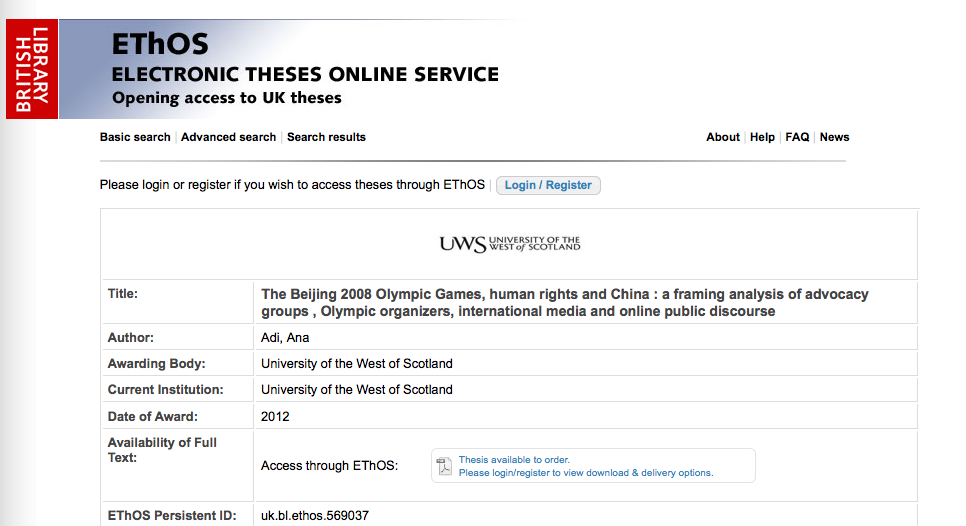You can now find my PhD thesis in the British Library collection of electronic theses.
Below is the abstract of my thesis:
The Olympic Games is a mechanism through which numerous advocacy and political groups compete to frame the media coverage that it generates. These processes are restricted by the relatively fixed guidelines imposed upon Olympic media by the International Olympic Committee (IOC,
2007). Yet, in the past years, the interaction among and communication between communicators, media and various publics has changed dramatically through the Internet one of the reasons being the emergence of convergent media structures. This thesis investigates the process of media convergence and transition that is occurring within the Olympic infrastructures as seen during the Beijing 2008 Olympic Games. Employing Entman’s (1993) framing theory as a theoretical background, this thesis analyses how ideology influenced the framing of China and discourses about its human rights record. Using online data collected during the Beijing 2008 Olympic Games, the thesis examines how discourse about China’s human rights changes from the official materials released by advocacy groups (Amnesty International and Human Rights Watch) and Olympic organizers (The Beijing Organizing Olympic Committee – BOCOG – and The International Olympic Committee – IOC) into online, international traditional media outlets (CNN, BBC, CCTV Channel 9, New York Times, Chicago Tribune, Guardian, The Telegraph, People’s Daily, China Daily) to the online readers that left comments for the media outlets. As such, employs qualitative and quantitative methods as well as traditional and computer assisted analysis to analyse the framing functions human rights had in different discourses. By integrating framing with the hegemonic thesis, it presents framing as a dynamic process, conceptualizing it as a strategy of constructing and processing news and as a characteristic of the discourse itself.
2007). Yet, in the past years, the interaction among and communication between communicators, media and various publics has changed dramatically through the Internet one of the reasons being the emergence of convergent media structures. This thesis investigates the process of media convergence and transition that is occurring within the Olympic infrastructures as seen during the Beijing 2008 Olympic Games. Employing Entman’s (1993) framing theory as a theoretical background, this thesis analyses how ideology influenced the framing of China and discourses about its human rights record. Using online data collected during the Beijing 2008 Olympic Games, the thesis examines how discourse about China’s human rights changes from the official materials released by advocacy groups (Amnesty International and Human Rights Watch) and Olympic organizers (The Beijing Organizing Olympic Committee – BOCOG – and The International Olympic Committee – IOC) into online, international traditional media outlets (CNN, BBC, CCTV Channel 9, New York Times, Chicago Tribune, Guardian, The Telegraph, People’s Daily, China Daily) to the online readers that left comments for the media outlets. As such, employs qualitative and quantitative methods as well as traditional and computer assisted analysis to analyse the framing functions human rights had in different discourses. By integrating framing with the hegemonic thesis, it presents framing as a dynamic process, conceptualizing it as a strategy of constructing and processing news and as a characteristic of the discourse itself.
